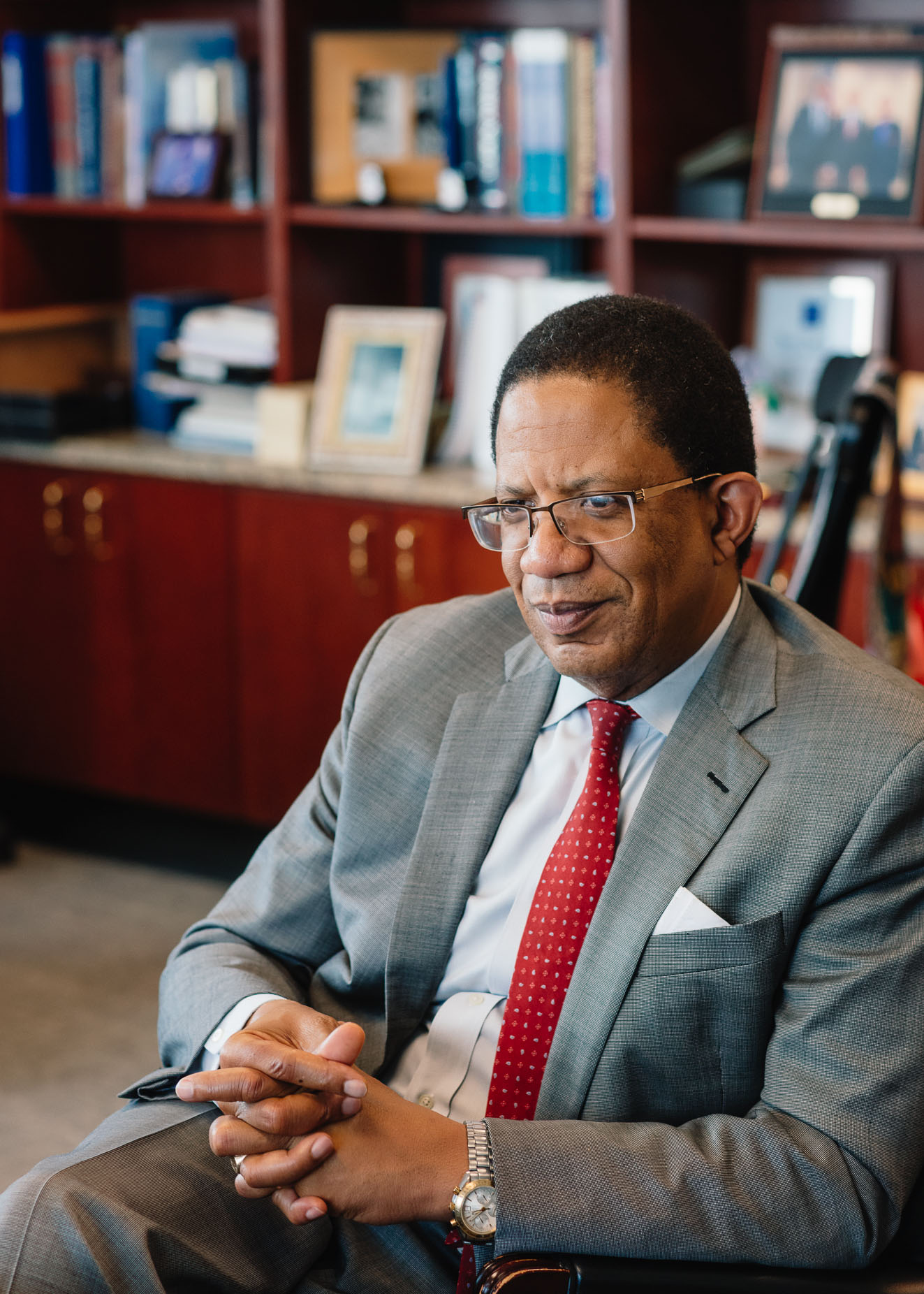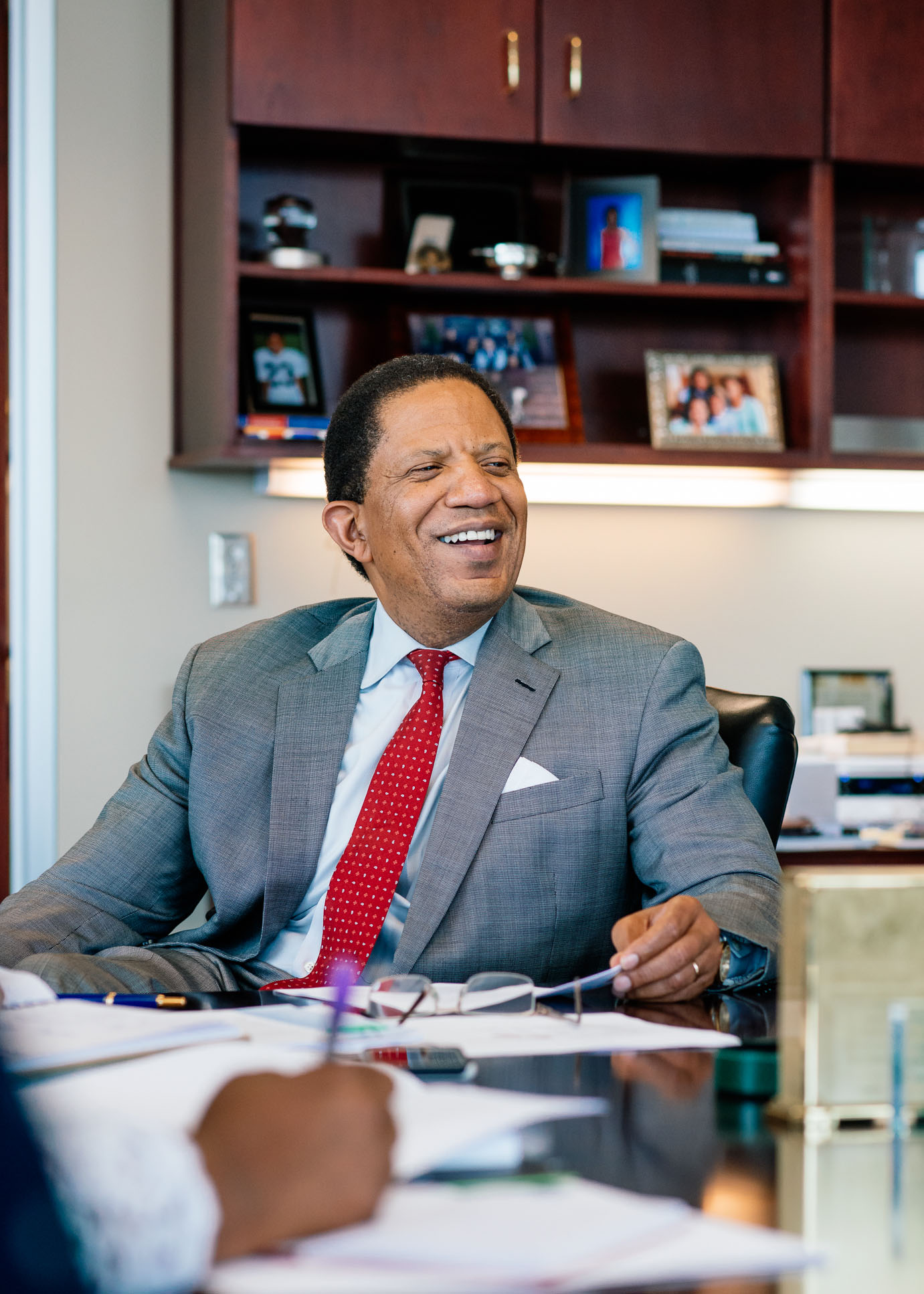 If you ask Selwyn Vickers, M.D., FACS, to tell you the foundations of his life, he’ll answer without hesitation: his faith, his family, and his friends.
If you ask Selwyn Vickers, M.D., FACS, to tell you the foundations of his life, he’ll answer without hesitation: his faith, his family, and his friends.
It takes grit and dedication to be the dean of any School of Medicine, but at UAB in particular, the school’s growth multiplies year after year—a noticeable illustration of Vickers’ strong leadership. From a $100 million increase in NIH funding over the past half-decade to a 25% increase in principal investigator recruitment and a sharp rise in medical school student applications, Vickers has generated tremendous progress at the School of Medicine.
However, if you talk with him one-on-one, his humble and earnest spirit will accredit any successes to his mentors, advisors, and—most importantly—his family.
“The Black Family: Representation, Identity, and Diversity”
From its beginnings, Black History Month has always centered on a specific theme each year—not to “limit the exploration of the Black experience, but to bring the public’s attention to important developments that merit emphasis,” Carter G. Woodson, founder of Black History Month, once said. This year’s is “The Black Family: Representation, Identity, and Diversity.”
In honor of Black History Month, the UAB School of Medicine communications team sat down with Dr. Vickers (virtually) to discuss his heritage, background, and influences.
Born in the Jim Crow era of the Deep South, the world-renowned surgeon and pancreatic cancer researcher has generational roots ingrained in the Black Belt of Alabama—a place that shaped and molded his family and his identity.
Vickers’ heritage: A pillar of education
As on every aspect of his life and career, Dr. Vickers has an oratorical way of recanting stories. Born in a small, rural Alabama county, Vickers reminisces on his earliest years: “I didn’t know where I was born in relation to anything else, but it is known today as the Black Belt. I grew up in Greene County, Alabama.”
Vickers was raised in a family characterized by the importance of education. His grandparents lived by the philosophy of Horace Mann that says “education is the great equalizer.”
In the early 1900s, his maternal great grandfather was notably taught by Booker T. Washington.
On the other hand, his paternal grandfather was illiterate for the first half of his life, a disenfranchisement of Jim Crow laws in the Deep South. However, he taught himself how to read and write at the age of 44 and remarkably became the Mayor of his town.
Also extraordinary, his maternal grandmother began pursuing her college degree in the 1920s. “She traveled to Snow Hill Academy in Camden to get her high school diploma, went to school for 10 summers to get her Bachelor’s degree, and then became a school principal,” Vickers says. “My mom never knew a woman in the house because my grandmother was always working.”
Vickers’ lineage is a family who didn’t give up, who didn’t lose hope, and who always pushed for more. Listening to him speak, one may describe the Vickers family as trailblazers or frontrunners, especially for their particular region. But in his voice, their attitudes for greatness were quite orthodox.
“My mother was a second-generation college graduate,” he says. His father was the oldest of 13 children, 11 of which graduated from college—some prior to the Civil Rights Movement and some during. “My dad was a first-generation college graduate with degrees in chemistry and music.”
Growing up during the Civil Rights Movement
Both Vickers’ parents were educators, but his father was also a Korean War vet. Additionally, he had graduated at the top of his class at Alabama A&M University.
“Although a college graduate in the top ten percent, and a Korean War veteran, he was still not able to vote,” Vickers recalls. “As a young kid, I remember my dad saying, ‘What else do you need to do to prove you are American?”
The summer before the Voting Rights Act of 1965 passed, his parents attended a Southern Christian Leadership Conference rally, led by Martin Luther King Jr. “It got back to the school superintendent and they were fired that summer for simply attending.” Vickers’ grandmother was distraught by the superintendent’s decision; she had loyally taught in the Greene County school system for over 40 years.
When asked how their attendance at the rally impacted him, Vickers says as a young child he remembers being distressed because he saw his parents suffer unjust ramifications. But over the course of his life, the impact has evolved and changed—affecting him differently through various seasons. Now, he says, he is inspired by their courage.
After the rally, the word around town was that Vickers’ father shouldn’t be hired. But, a nearby high school desperately needed a chemist and a band director—exactly John Vickers Jr.’s skill set. The family moved across the Tombigbee River to Demopolis and stayed there for two to three years, until Edward O. Eddins, member of the Alabama Senate (and uncle of Edward Partridge, M.D., former director of the O’Neal Comprehensive Cancer Center), met John Vickers Jr. and called a meeting with him.
Eddins said to John Vickers, Jr.: “We hear you’re smarter than average, and we can’t get a federal grant for our prisons if we don’t develop an education program for our prisoners. We need a Black educator to partner with us.” Dr. Vickers’ father helped developed the first teaching program for prisons, a job that built momentum for the trajectory of his career and greatly impacted incarcerated folks in Alabama.
Rural south to big city
Vickers says one of the most influential moments in his young life was moving to Huntsville in the early ‘70s for his dad to take a position at Alabama A&M University. There, neighboring families were integrated, and both Black and white families were highly successful. The diversity of Huntsville was largely due to funding for Warner Van Braun’s space program and the jobs that came with it.
In contrast to the racial violence and animosity of 1960s Birmingham and elsewhere in Alabama, Huntsville was an entirely different world. Word has it that Bobby Kennedy himself called the Mayor of Huntsville with a warning: if he ever saw the same racial violence and animosity of that in Birmingham, he would remove federal funding at once.
 Around the same time, Vickers became inspired by his Uncle Leroy’s profession in medicine.
Around the same time, Vickers became inspired by his Uncle Leroy’s profession in medicine.
“I had a chance to go visit him after his training and when he was practicing. That sealed the deal. I loved what he did for patients. He introduced me to a Black patient he had diagnosed with an aortic stenosis murmur. This patient couldn’t walk more than a block. Leroy got the patient diagnosed, got him to a cardiologist, and got his valve replaced. My uncle didn’t do the surgery himself—but this patient was so grateful for my uncle diagnosing his problem, not ignoring his pain, getting him where he needed treatment, and receiving full care.”
While Vickers’ family was the bedrock for his later success, so was the diversity of his surroundings in Huntsville, which ultimately contributed to shaping his identity.
A family of leaders
Rooted in regions known for stories of both hope and despair, the Vickers family is one of leadership and pioneered success, one individual at a time.
• His father, John Vickers, Jr., was in the first cohort of Black/African Americans to graduate with a Ph.D. from the University of Alabama. The cohort wanted to receive their Ph.D.’s but were initially prevented by departmental leadership. At that time, Black/African Americans had only been able to obtain an Ed.D. The cohorts’ advisor stepped in and advocated for the group to receive a Ph.D. in Educational Leadership and Administration instead of an Ed.D. Vickers went on to become the dean of Education at Alabama A&M University.
• Vickers’ uncle, Leroy Vickers, was the first physician graduate of Stillman College. After, he led a successful family practice in Cincinnati, Ohio.
• His aunt, Lelia L. Vickers, was one of the first Black/African American women to receive a Ph.D. from Duke University.
• In 1994, Dr. Selwyn Vickers was the first Black/African American to be offered a full-time faculty position at UAB School of Medicine in the Department of Surgery.
• He also became the first Black/African American in UAB’s Department of Surgery to hold an endowed chair position.
• In 2006, Vickers left Alabama to become the Jay Phillips Professor and Chair of the Department of Surgery at the University of Minnesota Medical School, one of the oldest, most admired departments in the country. He was the fourth chair in the department’s 115-year history, and he was the first Black/African American chair. He was also the only Black/African American faculty in the department at that time.
• In 2009, he was elected by his peers to the National Academy of Medicine in recognition of his outstanding achievements.
• In 2013, he was recruited back to UAB and became the first Black/African American dean at UAB School of Medicine and the first Black/African American to serve as senior vice president of Medicine.
• And among many other triumphs, he is president-elect of the American Surgical Association, the oldest and most prestigious surgical society in the country.
Building on the foundation of family
In the midst of great success, Vickers says there is always room at the top for leaders. He recalls that, while at Johns Hopkins, Dean Richard S. Ross explained to him that “there is constant crowding at the bottom, always crowding in the middle, but at the top there is indefinite and spacious opportunity if you are willing to compete to be the best.”
Dr. Vickers says that “it’s hard, but a worthwhile endeavor to make yourself a leader.” While he grew up in a family that encouraged him to reach his full potential, he recognizes that not everyone is raised in this particular circumstance.
“Perseverance is so important,” Dr. Vickers says. “Developing a character of willingness is the key to leadership. Be willing to delay instant gratification and wait. Be willing to rely on perseverance."
While encouraged by his family’s determination, Dr. Vickers lives out an eminent heritage for his own children. In a recent interview, his daughter, Adrienne Vickers, discusses the pillar of family and the hardworking examples that her father and grandfather have exemplified.
Read more about Dr. Vickers’ journey to becoming a physician, researcher, and leader.